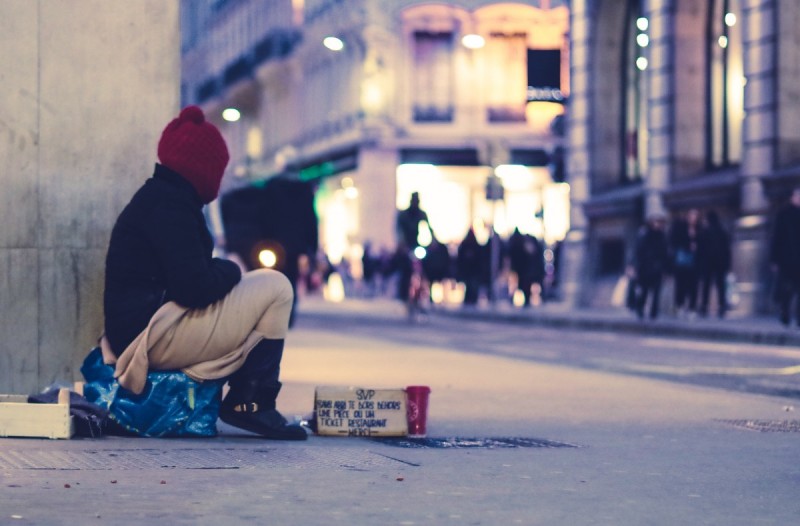Poverty is the result of policy decisions—but we have the power to end it

According to a recent study, 53 percent of Canadians live paycheque to paycheque and more than one in four of us doesn’t have enough money to make ends meet each month after paying bills and debt. Photo from Unsplash.
My grandfather, of blessed memory, died on my seventh birthday. Being so young, there’s a lot I don’t remember about him. The things I do remember are the smell of stale cigarette smoke, his love for me, and the poster of a tweed suited gentleman holding up a fine glass of liquor and leaning on a Rolls Royce proudly hanging on his washroom wall. “Poverty sucks” was emblazoned across the top in bold, all caps letters. He thought it was incredibly funny. I didn’t get the joke.
I still find myself wondering what he found so amusing about that poster. I imagine him, a survivor of two wars, a brutal prisoner of war camp, decades of alcoholism, and a long, hard won fight to unionize his factory, suddenly retired. No more ways to improve his station in life. No way out of the poverty he battled for decades. No more fights left to win. All he had left was a choice. He could either worry about what he could not change or he could laugh about it. I empathize with his decision. When all you’ve ever known is the crippling reality of not having enough, and you come to the end of the road where there’s no way out, what is there left to do?
Thirty years later, more of us are worried about poverty than ever before. A recent Maru/Blue Public Opinion poll of Canadians shows the issue is a very serious concern for nearly half of us, a number that’s almost doubled since they began tracking it in 1975. The numbers might be shocking but the signs are all around us for anyone who cares to look.
According to a 2019 BDO study, 53 percent of Canadians live paycheque to paycheque and more than one in four of us doesn’t have enough money to make ends meet each month after paying bills and debt. The pandemic has only made things worse with unemployment stuck at 9.4 percent and the prospects for the lowest earners looking pretty bleak.
It wasn’t that my grandfather made the wrong choice, he simply didn’t see any other way. There are other options though. It isn’t binary, and we have more than the humour of a self-deprecating poster or spending our days wallowing in worry.
Poverty is the product of policy decisions. When elected officials give billions of dollars in handouts to multinational conglomerates or nearly a trillion dollars to the big banks in liquidity support, they are making choices of their own. They are saying that the one in five children living in poverty by no choice of their own in Canada are less important to them than shareholder profits. They are showing through their actions that they care more about the interests of political donors and the business class than the reality for millions of economically struggling Canadians.
The good thing about choices is that they aren’t definitive. Every day, we gather new information, are influenced by others, and have the ability to change our minds. For those of us who can’t make ends meet, that means we can change our circumstances. Not through individual actions (no one of us is nearly powerful enough on our own to change policy) but through collective action. We have the power to change the minds and choices of policy makers.
A look at 20th century social movements shows us that change from the bottom up is imminently possible. According to research from the Belfer Center for Science and International Affairs, no government can withstand a challenge of 3.5 percent of its population without either accommodating the movement or disintegrating. The Arab Spring in Egypt and the Rose Revolution in Georgia are proof that we as people have the power to change our destiny.
Now, it’s not just my grandfather, but 20 million of us who are facing a choice. Do we accept our circumstances and find a way to laugh about them, or do we come together and demand action on wealth inequality, unemployment, and intergenerational poverty in this country?
We can change our economic reality. That’s not radical, it’s simply the truth, and now is the time. If we fail to act while the issues of the struggle of daily life are at the forefront of our political debate and national consciousness, we have no one to blame but ourselves.
I recently found that poster of my grandfathers rolled up in a tube in storage and that is where it is going to stay. While he may have been able to laugh about his situation, I cannot. I’m far too busy organizing for a better future to laugh about our challenges.
Joe Roberts is a veteran political strategist in both the US and Canada, Executive Director of the Centre for Canadian Progress, Co-Host of the political podcast New Left Radio, and Managing Director at Jewish Currents Magazine. Follow him on Twitter @Joe_Roberts01.

